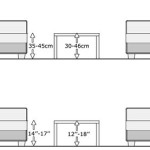Raised Bed Vegetable Garden Ideas
Raised bed vegetable gardens are a great way to grow your own food, even if you have limited space. By elevating your plants above the ground, you can improve drainage, extend the growing season, and protect your plants from pests and diseases. Plus, raised beds are easy to build and maintain, making them a great option for beginner gardeners.
Planning Your Raised Bed Vegetable Garden
The first step in creating a raised bed vegetable garden is to plan your layout. Consider the size, shape, and location of your beds, as well as the plants you want to grow. You'll also need to decide what materials you want to use to build your beds.
Raised beds can be built from a variety of materials, including wood, stone, bricks, or concrete blocks. Wood is the most popular material because it's inexpensive and easy to work with. However, wood can rot over time, so it's important to choose a rot-resistant wood, such as cedar or redwood.
Stone, bricks, and concrete blocks are more durable than wood, but they are also more expensive. If you're on a budget, you can use recycled materials, such as old tires or pallets, to build your raised beds.
Building Your Raised Bed Vegetable Garden
Once you've planned your layout and chosen your materials, you can start building your raised beds. The following instructions will show you how to build a simple raised bed using wood:
- Cut four pieces of wood to the desired length of your bed.
- Assemble the four pieces of wood into a frame, using galvanized screws or nails.
- Line the bottom of the frame with landscaping fabric to prevent weeds from growing.
- Fill the frame with a mixture of topsoil and compost.
- Plant your vegetables according to the spacing instructions on the seed packets.
Maintaining Your Raised Bed Vegetable Garden
Once your raised bed vegetable garden is planted, it's important to maintain it properly to ensure a bountiful harvest. Here are a few tips:
- Water your plants regularly, especially during hot weather.
- Fertilize your plants every few weeks with a balanced fertilizer.
- Weed your garden regularly to prevent weeds from competing with your plants for nutrients and water.
- Mulch your beds with straw or shredded leaves to help retain moisture and suppress weeds.
- Protect your plants from pests and diseases by using organic methods, such as companion planting and insecticidal soap.
By following these tips, you can grow a beautiful and productive raised bed vegetable garden that will provide you with fresh, homegrown produce for years to come.

Raised Bed Garden From A Z What To Know Joe Gardener
:max_bytes(150000):strip_icc()/September-Garden-4-27714c582b0d4ceaad95c9c24aaac9d9-25fe181085014f4381c4323f8ff30f3f.jpg?strip=all)
31 Easy And Inexpensive Diy Raised Garden Bed Ideas

4x8 Raised Bed Vegetable Garden Layout Ideas What To Sow Grow

18 Raised Garden Bed Ideas At All Price Points

28 Best Diy Raised Bed Garden Ideas Designs A Piece Of Rainbow

Raised Bed Garden Design How To Layout Build

25 Best Raised Bed Ideas Inexpensive Garden

18 Raised Garden Bed Ideas At All Price Points

25 Best Raised Garden Bed Ideas And Diy Layouts

How To Plan For A Raised Garden Bed Brepurposed








